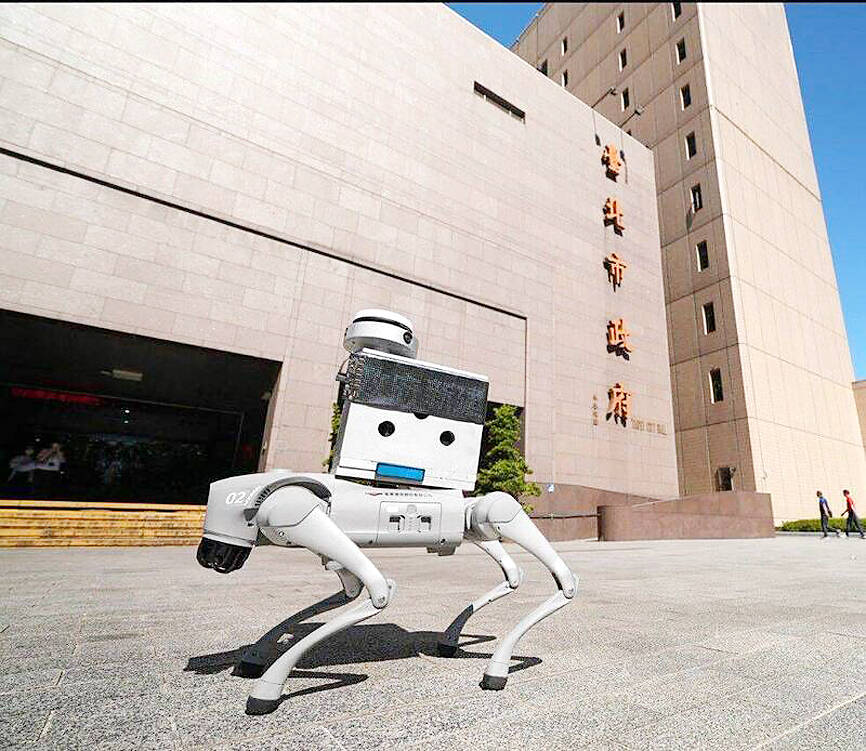Government agencies must secure approval from the Ministry of Digital Affairs (MODA) before they can use China-made cybersecurity products, incoming minister of digital affairs Lin Yi-jing (林宜敬) said yesterday.
Lin, who does not take office until Monday, made the statement during the news conference after the weekly Cabinet meeting, where new Cabinet members were introduced to the public, during which he was asked about the Taipei City Government’s plan to use robots manufactured in China for sidewalk inspections.
Executive Yuan spokeswoman Michelle Lee (李慧芝) said that government agencies have restricted the use of cybersecurity products manufactured in China following the promulgation of the Principles on Limiting Harmful Products Against National Information Security Used by Government Agencies (各機關對危害國家資通安全產品限制使用原則) in 2019.

Photo courtesy of the Taipei City Government
The ministry has also regulated the use of cybersecurity products in government departments since then, she added.
Lin said that approval from Taipei City Government and Executive Yuan chief information security officers, and the ministry would be required before government agencies could use Chinese cybersecurity products.
As of Wednesday, the ministry had yet to receive the Taipei City Government’s request to use Chinese robotic dogs, Lin said.
“We want to remind the city to beware of the cybersecurity implications of such use,” Lin added.
High-tech products, such as robotic dogs, are extremely sophisticated devices and could be connected to the Internet, Lin said.
“Even if current cybersecurity testing equipment indicates they are secure, their operating software could still be altered through remote connections and automatic updates. In such cases, hostile foreign forces might remotely control these devices and transmit data collected by robotic dogs abroad,” he added.
The city government’s plan sparked controversy after Taipei Deputy Mayor Lee Ssu-chuan (李四川) wrote about it on Facebook, and included a photograph of a robotic dog.
The robot, which has a panoramic surveillance system, would be able to flag problems and easily navigate narrow sidewalks, making inspections faster and more accurate, Lee said.
Democratic Progressive Party Taipei City councilors said that the body of the robotic dog was manufactured in China and demanded that the city government cease its use.
The city’s New Construction Office said that using the robotic dog for sidewalk inspections posed no security risk, as its panoramic surveillance system, data transmission function and its remote-control software were developed and integrated by a Taiwanese company.
The robotic dog is part of a trial program, and has yet to be officially applied in sidewalk inspections, they said.

Chinese spouse and influencer Guan Guan’s (關關) residency permit has been revoked for repeatedly posting pro-China videos that threaten national security, the National Immigration Agency confirmed today. Guan Guan has said many controversial statements in her videos posted to Douyin (抖音), including “the red flag will soon be painted all over Taiwan” and “Taiwan is an inseparable part of China,” and expressing hope for expedited reunification. The agency last year received multiple reports alleging that Guan Guan had advocated for armed reunification. After verifying the reports, the agency last month issued a notice requiring her to appear and explain her actions. Guan

GIVE AND TAKE: Blood demand continues to rise each year, while fewer young donors are available due to the nation’s falling birthrate, a doctor said Blood donors can redeem points earned from donations to obtain limited edition Formosan black bear travel mugs, the Kaohsiung Blood Center said yesterday, as it announced a goal of stocking 20,000 units of blood prior to the Lunar New Year. The last month of the lunar year is National Blood Donation Month, when local centers seek to stockpile blood for use during the Lunar New Year holiday. The blood demand in southern Taiwan — including Tainan and Kaohsiung, as well as Chiayi, Pingtung, Penghu and Taitung counties — is about 2,000 units per day, the center said. The donation campaign aims to boost

The Kaohsiung Tourism Bureau audited six hotels in an effort to prevent price gouging ahead of Korean band BTS’ concert tour in the city scheduled for Nov. 19, 21 and 22 this year. The bureau on Friday said that the audits — conducted in response to allegations of unfair pricing posted on social media — found no wrongdoing. These establishments included the local branches of Chateau de Chine, Hotel Nikko, My Humble House, and Grand Hai Lai, it said, adding that the Consumer Protection Commission would have penalized price gougers had the accusations been substantiated. The bureau said the Tourism Development Act

BACK TO WINTER: A strong continental cold air mass would move south on Tuesday next week, bringing colder temperatures to northern and central Taiwan A tropical depression east of the Philippines could soon be upgraded to be the first tropical storm of this year, the Central Weather Administration (CWA) said yesterday, adding that the next cold air mass is forecast to arrive on Monday next week. CWA forecaster Cheng Jie-ren (鄭傑仁) said the first tropical depression of this year is over waters east of the Philippines, about 1,867km southeast of Oluanpi (鵝鑾鼻), and could strengthen into Tropical Storm Nokaen by early today. The system is moving slowly from northwest to north, and is expected to remain east of the Philippines with little chance of affecting Taiwan,